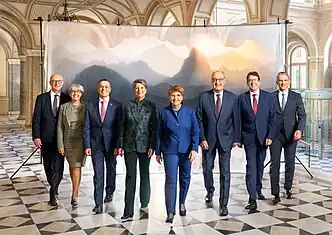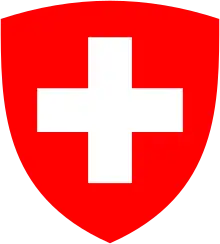| This article is part of a series on the |
.svg.png.webp) |
|---|
|
|

This is a list of members of the Swiss Federal Council,[1] in chronological order and for any given year since inauguration of the Federal Council, from 1848 to present. Its seven members constitute the federal government of Switzerland and collectively serve as the country's head of state. Each of the seven Federal Councillors heads a department of the Swiss federal administration.[2]
The members of the Federal Council are elected for a term of four years by both chambers of the federal parliament sitting together as the United Federal Assembly. Each Federal Councillor is elected individually by secret ballot by an absolute majority of votes.[3] Once elected for a four-year-term, Federal Councillors can neither be voted out of office by a motion of no confidence nor can they be impeached. Reelection is possible for an indefinite number of terms. Parliament has decided not to reelect a sitting Federal Councillor only four times and only twice (in 2003 and 2007) since 1872. In practice, therefore, Federal Councillors serve until they decide to resign and retire to private life, usually after three to five terms of office.[4]
Chronological, global
Timeline

Notes
- ↑ German: Schweizerischer Bundesrat, French: Conseil fédéral suisse, Italian: Consiglio federale svizzero, Romansh: Cussegl federal svizzer.
- ↑ Swiss Federal Constitution / Bundesverfassung (BV) / Constitution fédérale (Cst.) / Costituzione federale (Cost.) of 7 February 1999, SR/RS 101 (E·D·F·I), art. 177 (E·D·F·I)
- ↑ This is the prevailing reading of the relevant constitutional provision: Swiss Federal Constitution / Bundesverfassung (BV) / Constitution fédérale (Cst.) / Costituzione federale (Cost.) of 7 February 1999, SR/RS 101 (E·D·F·I), art. 175 (E·D·F·I)
- ↑ Federal Council in German, French and Italian in the online Historical Dictionary of Switzerland.
- ↑ Members are elected by federal parliament for a four-year term and traditionally re-elected. If the predecessor died in office, date of election, otherwise – if available – first day in office.
- 1 2 3 4 Not reelected (Jean-Jacques Challet-Venel, Ulrich Ochsenbein, Ruth Metzler, Christoph Blocher)
- 1 2 3 4 The office was previously declined by the first person elected:
- 11 July 1855 Johann Jakob Stehlin (1803–1879) BS;
- 18 December 1875 Charles Estoppey (1820–1888) VD;
- 10 December 1875 Louis Ruchonnet (1834–1893) VD, accepted later;
- 22 February 1881 Karl Hoffmann (1820–1895) SG;
- 3 March 1993 Francis Matthey (1942–) NE.
- 1 2 Exceptionally low representation of the French and Italian speaking cantons, compared to the German speaking ones (1:6). In recent years, those were overrepresented 3:4 (proportional to their population). Currently, the 2:5 proportion is close to the population proportion.
- ↑ Traditional "magic formula" of the Council's composition established: FDP/PRD 2, CVP/PDC 2, SPS/PSS 2, SVP/UDC 1.
- ↑ Government composition changed for the first time since 1959: FDP/PRD 2, SPS/PSS 2, SVP/UDC 2, CVP/PDC 1.
- ↑ In June 2008, parts of the SVP/UDC broke away to later form the new BDP/PBD. In this process, the two Federal Councillors who had been elected for the SVP/UDC became members of the BDP/PBD.
References
- Federal Council in German, French and Italian in the online Historical Dictionary of Switzerland.
- Swiss Federal Chancellery. "The Swiss Confederation: A brief guide 2007". Archived from the original on 14 May 2013. Retrieved 10 February 2008.
- Services of the Swiss Parliament. "Resultate der Wahlen des Bundesrats, der Bundeskanzler und des Generals" (PDF). Archived from the original (PDF) on 27 February 2008. Retrieved 10 February 2008.
- Swiss Federal Chancellery. "Chronological index of Federal Councillors". Archived from the original on 2 January 2008. Retrieved 10 February 2008.
- Swiss Federal Chancellery. "Members of the Federal Council who declined election". Archived from the original on 3 February 2008. Retrieved 10 February 2008.
- Church, Clive H. (2004). The Politics and Government of Switzerland. Palgrave Macmillan. ISBN 0-333-69277-2.
